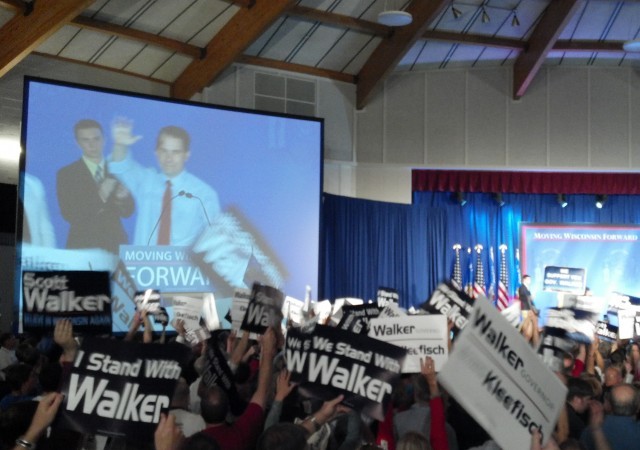
Two of the targets of the John Doe investigation against Scott Walker and conservative activists have filed a Petition for en banc rehearing by the full 7th Circuit Court of Appeals, after a 3-judge panel dismissed their lawsuit against the John Doe prosecutors on the grounds that the federal courts should not intervene in a state investigation.
The Petition for Rehearing, With Suggestion for En Banc Review, is embedded at the bottom of this post.
The legal history is detailed in these prior posts:
- Appeals Court lifts injunction against “John Doe” investigation of Walker and conservatives
- Exposed: How Prosecutors targeted Scott Walker and conservatives
- Federal Appeals Ct upholds injunction against Wisconsin “John Doe” investigation pending appeal
- Fed District Court reinstates injunction against Wisconsin “John Doe” anti-conservative probe
The short version is that the targets initially succeeded at the federal trial court level in obtaining an injunction shutting down the investigation (which already was on hold because of a state court judge’s ruling), and allowing the civil damages lawsuit against the prosecutors/investigators to go forward in federal court. The Court of Appeals reversed, finding that there was no ground for the federal courts to intervene in a state investigation, particularly where a state judge already had effectively shut it down (which is on appeal in the state court system).
Here are the grounds stated in the Petition to have the entire 7th Circuit rehear the case:
Statement Respecting Rehearing En Banc
Rehearing en banc is warranted in this case for two reasons:
1. The panel decision conflicts with the Supreme Court’s decisions in Sprint Communications, Inc. v. Jacobs, 134 S. Ct. 584 (2014), and Dombrowski v. Pfister, 380 U.S. 479 (1965), and decisions of this Court regarding abstention in deference to state-court proceedings.
2. This case presents a question of exceptional importance: Whether federal courts may abstain from exercise of their jurisdiction to enforce federal rights in deference to state-court proceedings that are not eligible for abstention under Younger v. Harris, 401 U.S. 37 (1971), and offer no opportunity for enforcement of those federal rights.
Here are excerpts from the Introduction section of the Petition, setting forth where they believe the original appeals panel went wrong:
The panel decision holds that individuals targeted for retaliatory investigation by state law-enforcement officers on the basis of their political beliefs can obtain no relief in federal court due to “principles of equity, comity, and federalism.” App. 6. That decision breaks with the fifty-year line of jurisprudence beginning with Dombrowski v. Pfister, 380 U.S. 479 (1965), which held that enforcement of state law “in bad faith to impose continuing harassment in order to discourage” the exercise of federal rights states a proper civil-rights claim that a federal court is duty-bound to resolve. Instead, according to the panel, Plaintiffs’ ability to persuade a state court to quash a single subpoena conclusively demonstrates that there is no need for a federal injunction.
If only that were so. But the gravamen of Plaintiffs’ claim, and the source of their injuries, is not that they were subjected to a single state-court proceeding premised on Defendants’ misapprehension of Wisconsin campaign-finance law. Instead, the claim they brought was for viewpoint-based retaliation, challenging a course of bad-faith conduct that extends far beyond a single subpoena. Their complaint describes at length—in allegations whose plausibility has been upheld by the district court—how a team of state law-enforcement officers, led by Milwaukee County District Attorney John Chisholm, targeted Plaintiffs and scores of other conservatives for harassment based on their political beliefs and activism through a four-year-long secret criminal investigation aimed at bringing down Governor Scott Walker and reversing his policies….
In short, Defendants have launched a permanent campaign of intimidation and harassment against Wisconsin conservatives—because they are conservatives—and the resulting First Amendment injury is one that no pending state-court proceeding can possibly remedy….
WI John Doe Appeal – Petition for en Banc Rehearing
 DONATE
DONATE
Donations tax deductible
to the full extent allowed by law.








Comments
Excellent brief. If the appeals court does not man up and agree to re-hear and correct this decision en banc, O’Keefe’s counsel has layed the groundwork for the Supreme Court to take this case.
What’s the timeline for the response, reply, and decision?
The Wisconsin John Doe Law seems to be on built on a very shaky Constitutional foundation. The law begins
Begun the Law Wars have.
Yoda you are channeling, yes?
Reverse Polish Notation, my browser’s settings are locked.